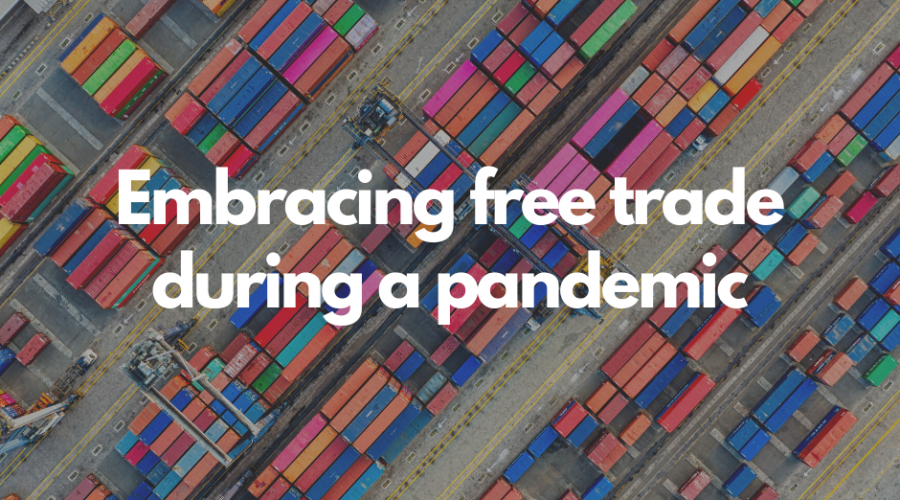Embracing free trade during a pandemic
Whether we will be able to get back on track on globalisation and economic liberalisation will be one of the most important tests for the post-coronavirus world. While lockdowns introduced by some governments are hopefully not going to stay there indefinitely, the perception of the role of international cooperation is likely to undergo some substantial shifts in the long run. International trade as a key instrument of promoting peace and prosperity will be a first casualty.
The EU-Mercosur agreement and the UK government’s ambition to become a global champion of free trade have become some of the most recent exciting developments. Despite a popular belief that free trade has been in decline for a couple of years, the number of new interventions implemented each year globally has sharply dropped. On the other hand, It would, of course, be desirable to see more liberalising policies instead but sometimes the absence of damaging action is sufficiently good in itself.
The outbreak of COVID19 which has shattered the very roots of international cooperation also threatens this dynamic. One after another, countries have turned inwards to deal with the pandemic and shut themselves down from the rest of the world. Lockdowns are a timely reminder that in spite of globalisation – or even hyper globalisation in case of the EU – nation-states remain the driving force of global order. Where does this leave international trade?
International trade has lifted billions out of poverty and benefited consumers of all nations, races, and genders. More importantly, it has encouraged states to look beyond their borders to improve things at home through an increase in choice and lower prices as well as more export opportunities. By facilitating and sustaining integrated supply chains, the success of international trade made states mutually dependent. For better or worse, the concept of the all-producing nation-state was dissolved in international trading relationships.
Trade protectionism originated as an aspiration to achieve self-sufficiency and reduce reliance on foreign supplies. At the outset of trade interventionism, uncontrollable factors such as the possibility of crop failure in other countries were used to justify import restrictions and the subsidising of domestic agriculture. The inconsistency of such a worldview was that countries that promoted self-reliance were in no way immune to bad harvests themselves and hence had to turn to others in their hour of need.
China is currently being affected by 6490 harmful trade interventions, the highest in the world. Ironically, the origin of COVID19 also comes from the city of Wuhan in China. President Trump – known for his extremely hostile attitude to trade with China – even called it the “Chinese virus”. It sounds like an excellent excuse to introduce more tariffs in the future, doesn’t it?
The idea of national self-sufficiency sounds great on paper but it is very hard to achieve now that we have progressed so far with globalisation. From iPhones to agriculture and vital drugs, we are dependent on other countries, and especially on China.
Even in the EU, lockdowns and travel restrictions imposed on national levels have resulted in new border checks causing traffic jams and supply delays. “All our food is getting to the warehouses — with delays — but it’s getting there,” said Bart Vandewaetere, vice president for government relations at Nestlé. In the worst-case scenario, we would be left without food on our shelves. Hence why the first thing governments should do before imposing emergency measures is ensuring the unrestricted and smooth flow of goods.
We will wake up to a totally different world once the pandemic is over. More countries will likely want to move the needle away from globalisation and mutual dependency to avoid the spread of new viruses in the future. Though trade cannot halt the pandemic, it can help us get through it by ensuring that essentials make it to us thus mitigating some of its consequences. At all times, we need more trade, not less.
The Consumer Choice Center is the consumer advocacy group supporting lifestyle freedom, innovation, privacy, science, and consumer choice. The main policy areas we focus on are digital, mobility, lifestyle & consumer goods, and health & science.
The CCC represents consumers in over 100 countries across the globe. We closely monitor regulatory trends in Ottawa, Washington, Brussels, Geneva and other hotspots of regulation and inform and activate consumers to fight for #ConsumerChoice. Learn more at consumerchoicecenter.org

